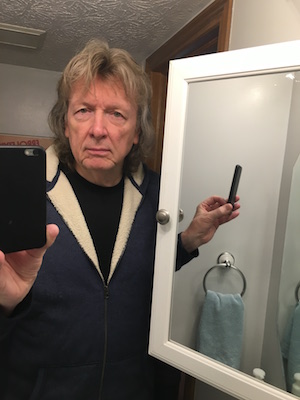
Roy Bentley
Poetry
Roy Bentley’s work has been recognized with fellowships from the NEA, the Florida Division of Cultural Affairs, and the Ohio Arts Council. Poems have appeared in The Southern Review, Shenandoah, Pleiades, Blackbird, North American Review, Prairie Schooner and elsewhere. Books include Boy in a Boat (University of Alabama, 1986), Any One Man (Bottom Dog, 1992) and The Trouble with a Short Horse in Montana (White Pine, 2006). Starlight Taxi, his latest, won the 2012 Blue Lynx Prize in Poetry and has just been published by Lynx House Press.
One Wench in the House between Them
They lived together on the Bank side, not far
from the playhouse, both bachelors;
lay together; had one wench in the house
between them which they did so admire.
—John Aubrey
On meeting, Neal Cassady asks Jack Kerouac
about a rhythm that begins in the wires
above a road at dawn, wind just right,
and whether it has anything to do with Bop
or the whereabouts of God. Jack, smiling,
says that Allen Ginsberg, jacking off
in an East Harlem apartment, heard
a voice he attributed to William Blake.
Neal, Holy Goof, can throw a football
60 yards in a nautilus-like tight spiral,
run the 100 in under ten, jump 23 feet
dead still. Says he can please three women
in synchronous rotation for days and days.
“When I finished my first book,” Jack one-ups,
“I fingered this thin hole in the ground,
fucked Ozone Park.” Neal: I can see that.
__________
In the loft on Russell Street, in San Francisco,
Jack types, stops. Cable-car noises in the streets
punctuate a simple-covenant purer jazz of night,
idleness. Neal and Carolyn Cassady couple below.
Carolyn’s sweet, come-cry anthem, within hearing,
insists, though Eisenhower is President,
that this be shared. Come down, Jack, they say.
This land is not the sweet home that it looks.
They burn who are living. Come down.
__________
After On the Road three locals follow Kerouac
from the Kettle of Fish Bar in the Village;
they stop traffic to take turns at the famous face.
Staggering to hospital, Jack watches East 13th Street,
a gray tide and light, become a junked-out
Mexican woman, Esperanza Villanueva,
who sold morphine. A dark, bilingual angel.
Your name means Hope, he’d meant to tell her.
__________
Black night seas are the centers of the eyes
of a Portuguese woman Kerouac promises
one hundred dollars the year before he dies
to gaze, for an hour, back at him. The hour
the two sit, half-candle in a saucer the only light,
the woman’s lover sleeps heavily beside her
on a throw of pillows, defeating the concentration
and connection. It’s the intimacy he wants:
someone, anyone, to halt the thieving future
and return everything. After, he hears
“I have done this thing” and pays her.
for Kevin and Martha Michael
from the playhouse, both bachelors;
lay together; had one wench in the house
between them which they did so admire.
—John Aubrey
On meeting, Neal Cassady asks Jack Kerouac
about a rhythm that begins in the wires
above a road at dawn, wind just right,
and whether it has anything to do with Bop
or the whereabouts of God. Jack, smiling,
says that Allen Ginsberg, jacking off
in an East Harlem apartment, heard
a voice he attributed to William Blake.
Neal, Holy Goof, can throw a football
60 yards in a nautilus-like tight spiral,
run the 100 in under ten, jump 23 feet
dead still. Says he can please three women
in synchronous rotation for days and days.
“When I finished my first book,” Jack one-ups,
“I fingered this thin hole in the ground,
fucked Ozone Park.” Neal: I can see that.
__________
In the loft on Russell Street, in San Francisco,
Jack types, stops. Cable-car noises in the streets
punctuate a simple-covenant purer jazz of night,
idleness. Neal and Carolyn Cassady couple below.
Carolyn’s sweet, come-cry anthem, within hearing,
insists, though Eisenhower is President,
that this be shared. Come down, Jack, they say.
This land is not the sweet home that it looks.
They burn who are living. Come down.
__________
After On the Road three locals follow Kerouac
from the Kettle of Fish Bar in the Village;
they stop traffic to take turns at the famous face.
Staggering to hospital, Jack watches East 13th Street,
a gray tide and light, become a junked-out
Mexican woman, Esperanza Villanueva,
who sold morphine. A dark, bilingual angel.
Your name means Hope, he’d meant to tell her.
__________
Black night seas are the centers of the eyes
of a Portuguese woman Kerouac promises
one hundred dollars the year before he dies
to gaze, for an hour, back at him. The hour
the two sit, half-candle in a saucer the only light,
the woman’s lover sleeps heavily beside her
on a throw of pillows, defeating the concentration
and connection. It’s the intimacy he wants:
someone, anyone, to halt the thieving future
and return everything. After, he hears
“I have done this thing” and pays her.
for Kevin and Martha Michael
